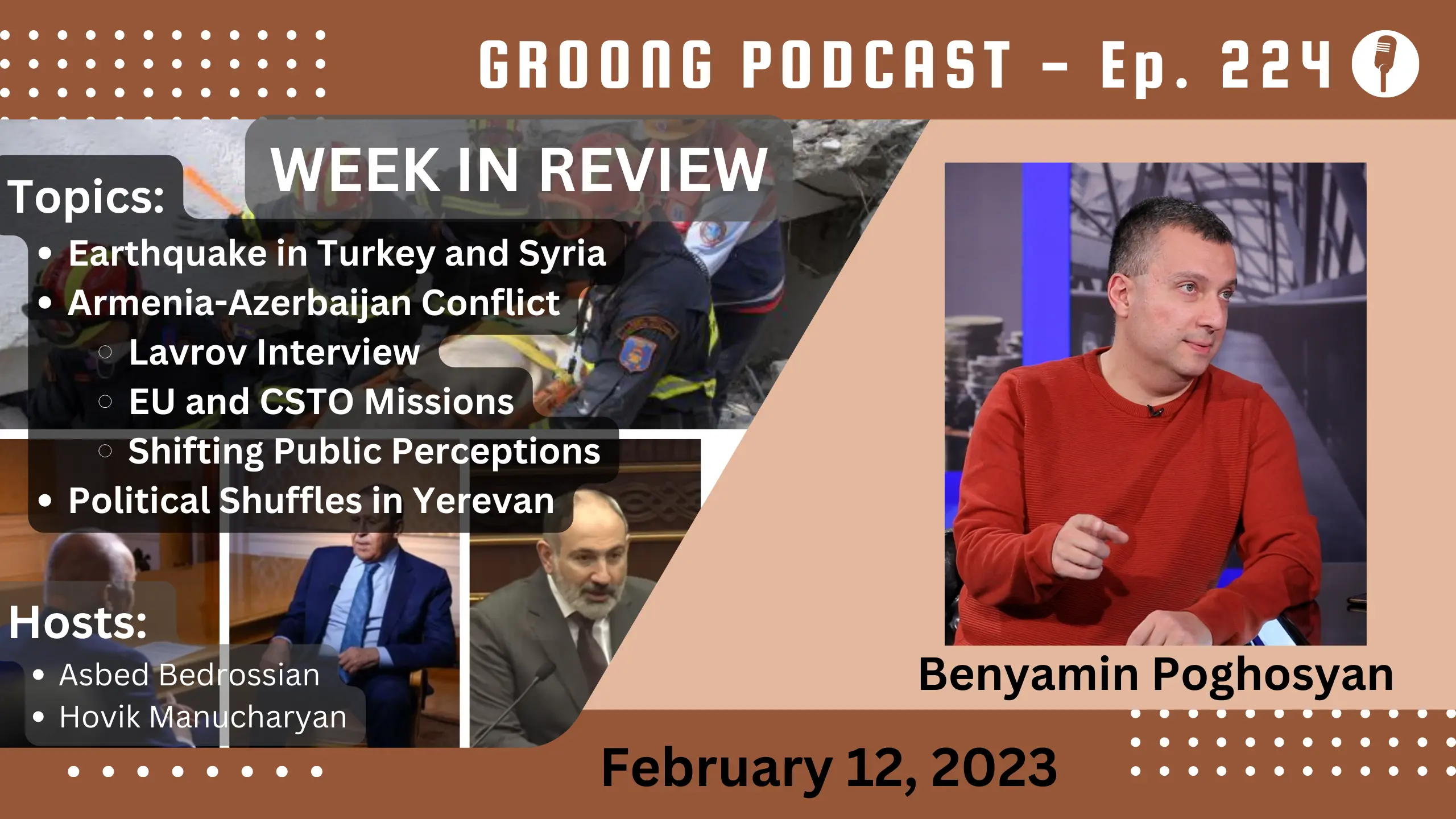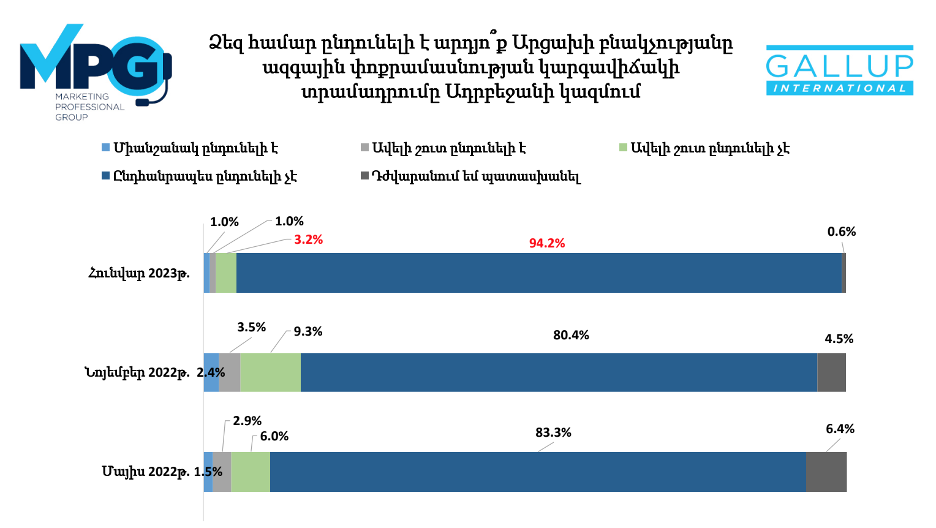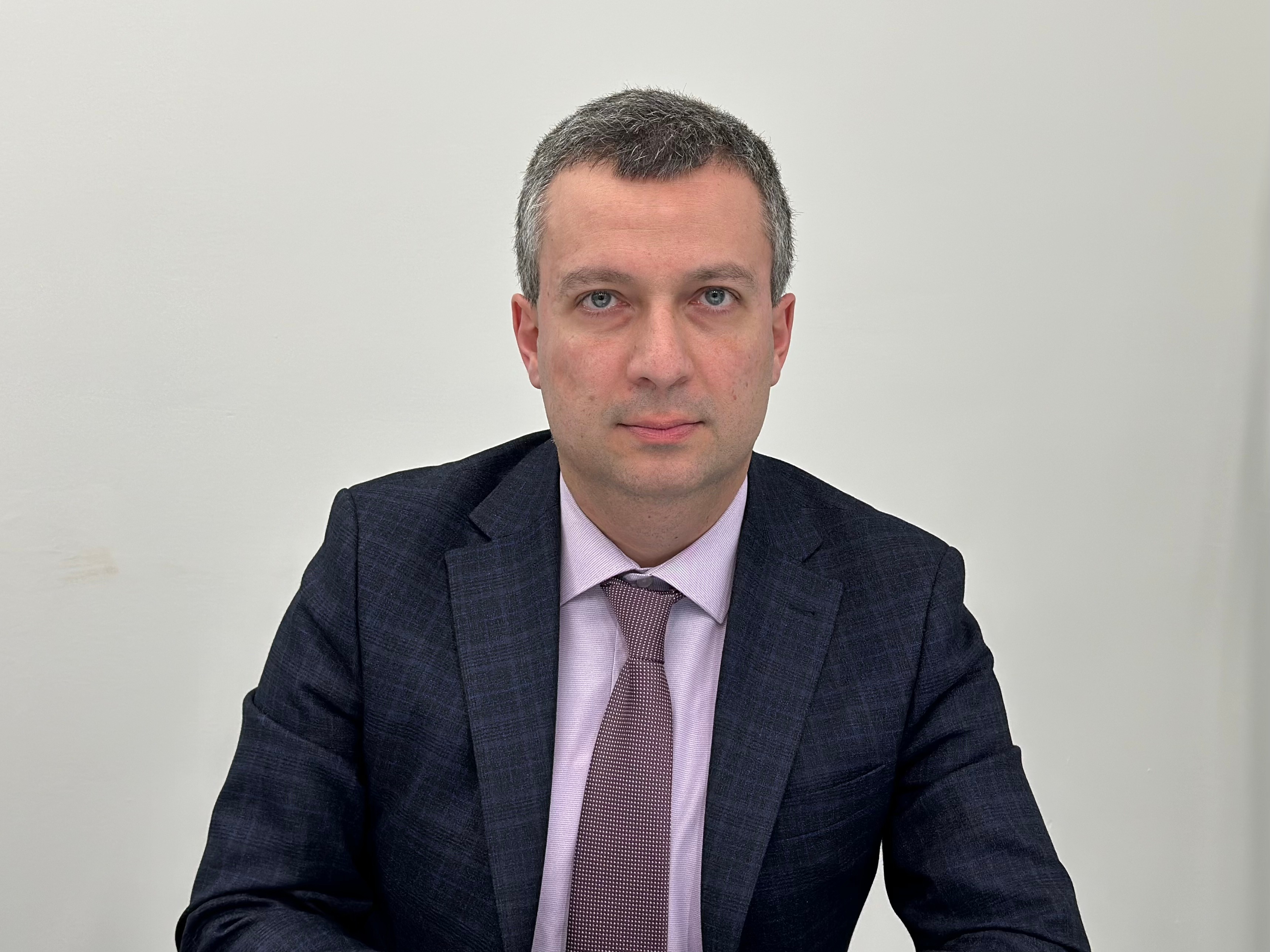
Guest:
Topic:
- Earthquake in Turkey and Syria
- Armenia-Azerbaijan Conflict
- FM Lavrov’s Interview to Russian Media
- EU vs CSTO Missions
- Shifting Public Perceptions
- Political Shuffles in Yerevan
Episode 224 | Recorded: February 12, 2023
Show Notes
Earthquake in Turkey and Syria
On Monday, a magnitude 7.8 earthquake hit the Marash region of Turkey. This is the northeast of historic Armenian Cilicia. The quake also shot straight down to Syria where it was felt as a 7.5, in the regions of Idlib and Aleppo, and was also felt very powerfully all the way down in Beirut, Lebanon. The deaths now exceed 29,000, over 6,000 buildings are estimated to have collapsed, and the western sanctions on Syria were a major obstacle to sending immediate aid to help those in need in that country, although on Thursday the US signed a special blanket clearance for all earthquake-related humanitarian aid to Syria for the next 6 months. Turkish early response was slow, although international response was swift, and a reported over 160,000 rescue workers were in the affected regions of Turkey, helping the hundreds of thousands in need.
Armenia has also dispatched rescuers to both Syria and Turkey. The 27-member team in Turkey is working in the Adiyaman region. The 29-member team to Syria is in Aleppo, where many Armenian deaths have been reported. Armenia also sent over 30 tons of food supplies to Syria.
Some, in Armenia, have criticized Armenia’s efforts. Deputy speaker of parliament Hakob Arshakyan hit back at them for this, and deputy speaker Ruben Rubinyan explained his take as well.
Questions:
- How can we explain the argument?
- Does this event affects the math for the elections in May, for Erdogan? How?
- Does this event change the balance of interdependency between Russia and Turkey?
Armenia - Azerbaijan Conflict
Lavrov on Armenia-Azerbaijan Conflict
On February 2 Russian FM Sergey Lavrov gave an interview to Russian TV 24. He discussed issues ranging from the Russia-West conflict, the war in Ukraine, Georgia, Moldova, as well as the ongoing conflict between Armenia and Azerbaijan.
Glaringly, Lavrov stated that since the government of Armenia had decided to formalize a peace treaty based on the 1991 Alma-Ata principles, then the Armenia-Azerbaijan border would run essentially along the border of the two former Soviet republics; he said that left Artsakh, Nagorno-Karabakh inside Azerbaijan, and also asserted that in 2020 Armenia lost 7 regions back to Azerbaijan, which it had occupied for 30 years.
Questions:
- Some, even opposition leaning analysts, have accused Russia of crossing red lines in the Armenian-Russian relationship. Would you agree with that? And what are the repercussions of this perspective by Russia, on the Armenian-Azerbaijani conflict?
EU Monitors
Well, the EU monitors are here, we hear. A lot of questions remain about their mission, given that 2 months since the end of 2022, they have filed no public reports.
In justifying the rejection of a monitoring mission from the CSTO in lieu of a similar mission from the EU, Armenian authorities claimed that the CSTO has not made a political statement about Azerbaijan’s incursion into Armenian territory.
Question:
- As we know, Armenia has agreed to an expanded EU mission to the borders. Has the EU satisfied the same Armenian conditions that the CSTO has not?
Nikol Pashinyan made startling comments in the parliament on Wednesday, saying that EU officials are looking at Armenia with suspicion because Azerbaijan is spreading propaganda that Russia and Armenia are planning to attack it. Pashinyan claimed that this is one of the chief reasons the EU agreed to send monitors, to verify and ensure that Russia is not planning to attack Azerbaijan.
Question:
- This is a bombshell announcement. Isn’t Pashinyan hurling Armenia into a confrontation between EU and Russia? The Russians have vocally expressed suspicion and unease with the EU monitors and it seems that now Pashinyan is validating Russian fears that the EU is here primarily to keep tabs on Russians, including the 102nd base in Gyumri, and NOT to deter Azerbaijan from attacking.
MPG Poll on Geopolitical Views
Late in January MPG polled 1100 residents of Armenia during January 2023, for their views on the ongoing conflict between Armenia and Azerbaijan in the aftermath of the 2020 44-day war. It shows an evolving view of Russia amongst the public.
Key Questions asked by the MPG Poll
- Whom do they hold most responsible for the Lachin/Berdzor Corridor crisis (Artsakh Blockade)?
- Which countries are doing the most to help, and which are doing the most to exacerbate the crisis?
- Which country is the most responsible to fix the situation?
- Assessing the response of the government, and the opposition.
- In which direction should Armenia’s foreign policy vector lean?
- Is it OK to leave Artsakh-Armenians in Azerbaijan?
- From which countries can Armenia expect strategic support?
- Assess the role of the Russian peacekeepers? The 102nd Military Base?
- Reaction to Pashinyan declining CSTO military exercises in Armenia in 2023?
Is it OK to leave Artsakh-Armenians in Azerbaijan?

Political Shuffles in Yerevan
The year 2023 began with a number of resignations and new appointments in Yerevan politics. Here is an incomplete list of some of the resignations:
Christine Grigoryan resigned from the HR ombuds position
In her statement, Grigoryan said she was headed for a new position, but did not say what that position would be. She is rumored to be headed to the Supreme Judicial Council (SJC), which oversees judges in Armenia. This is a controversial body long slammed by Armenian and international NGOs as compromising the independence of the Armenian judicial system.
Grigoryan resigned on January 23, 365 days after she was appointed as Armenia’s HR ombudswoman. While the law requires the government to nominate a new candidate within 10 days, no names have been put forward yet, and no reasons were given for the breach of law by parliament.
Tatevik Simonyan’s name has come up as a possible candidate. She’s currently a deputy minister of labor and social affairs. (Hovik: clothing shop manager for 16 years?)
Eduard Aghajanyan Resigns from Parliament
Aghajanyan has been an important ally of Pashinyan since the founding days of Civil Contract. In October he was not re-elected to the governing body of the ruling party, and on January 27th he tendered his resignation.
Civil Contract MP Sargis Khandanyan was confirmed by a strictly party-line vote to replace Aghajanyan as the chair of the Foreign Relations Committee in parliament.
Shirak Governor Shuffle
On January 25 governor of Shirak Marz Nazeli Baghdasaryan resigned. The next day, Mushegh Muradyan was appointed as new governor of Shirak.
Debacle in Education
In December, Deputy Prime Minister Hambardzum Matevosian and Education Minister Vahram Dumanian were sacked, after they failed to secure the election of the government’s desired candidate as the new president of Brusov State university.
The government wanted Davit Gyurjinyan, but government critic Karine Harutyunyan was re-elected, 12-8, despite half of the voting board members being ruling party appointees.
Dumanyan was replaced by one of his deputies, Zhanna Andreasyan.
Matevosyan was replaced by Tigran Khachatryan.
Other Recent Changes
- Deputy Minister of Economy, Armen Arzumanyan
- Deputy Chief Enforcement Officer, Artur Harutyunyan.
- Deputy Chief Enforcement Officer, Artur Vardanyan.
- Deputy Chief of General Staff, Arakel Martikyan.
- New Deputy Chief of the General Staff, Samvel Movsisyan
- Advisor to the DM, Major-General Vardan Avetisyan.
- And more…
Topics from the Panelists
- Benyamin - Increased Russian diplomatic activity in Armenia
- Hovik - Armenian Government Stonewalling Armenian Media
- Maps released in the Hague
Wrap-up
We hope you found our Week in Review helpful. We invite your feedback and your suggestions, you can find us on most social media and podcast platforms. Thanks to Laura Osborn for the music on our podcasts.
Guests

Benyamin Poghosyan
Dr. Benyamin Poghosyan is a Senior Research Fellow at APRI Armenia, a Yerevan based think tank,and the Chairman of the Center for Political and Economic Strategic Studies. He has served as the vice president for research and head of the Institute for National Strategic Studies at the National Defense Research University in Armenia. Dr. Poghosyan was a Distinguished Research Fellow at the US National Defense University College of International Security Affairs. He is a graduate from the US State Department Study of the US Institutes for Scholars 2012 Program on US National Security Policy Making. He holds a PhD in history and is a graduate from the 2006 Tavitian Program on International Relations at Fletcher School of Law and Diplomacy.
Hosts

Hovik Manucharyan
Hovik Manucharyan is an information security engineer who moved from Seattle to Armenia in 2022. He co-founded the ANN/Groong podcast in 2020 and has been a contributor to Groong News since the late 1990s.
Disclaimer: The views expressed by Hovik Manucharyan on the ANN/Groong podcast are his own and do not necessarily reflect the opinions of his employer or any other organization.

Asbed Bedrossian
Asbed Bedrossian is an IT professional, and for years oversaw the central IT enterprise infrastructure and services at USC. His decades of experience spanned across IT strategy, enterprise architecture, infrastructure, cybersecurity, enterprise applications, data center operations, high performance computing, ITSM, ITPM, and more.
Asbed founded the Armenian News Network Groong circa 1989/1990, and co-founded the ANN/Groong podcast in 2020.